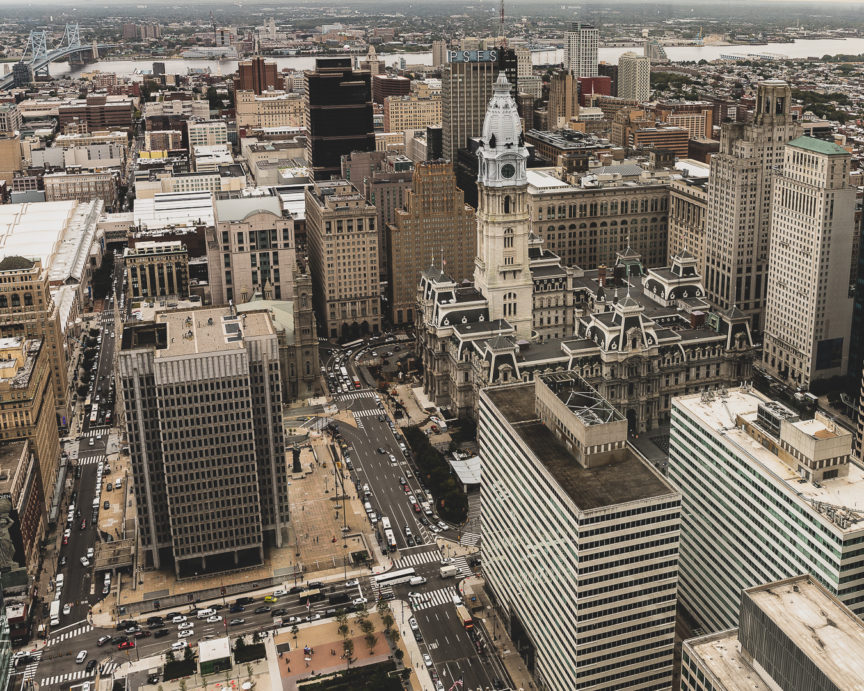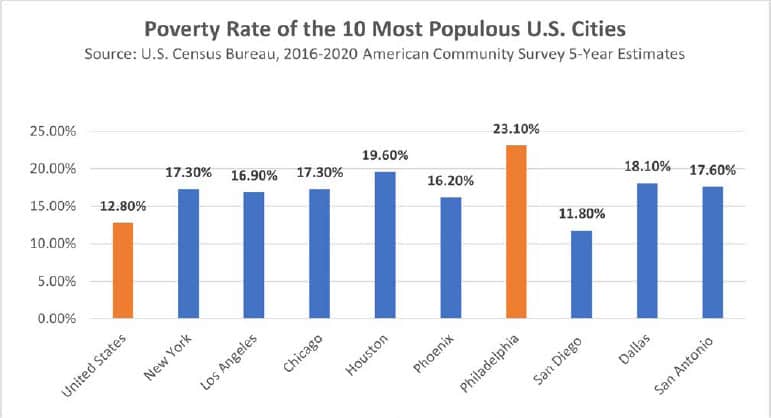MAYOR PROPOSES $5.6B BUDGET WITH INCREASED SPENDING ON PUBLIC SAFETY, NO TAX RATE INCREASES
As Philadelphia emerges from a two-year COVID-19 pandemic while struggling with a gun violence crisis, Mayor Jim Kenney proposed a Fiscal 2023 city budget this week reflecting both those realities, sending Council a budget with no tax rate increase and increased investments in policing and violence prevention programs.
Mayor Kenney proposed a $5.61 Billion operating budget for the city’s next fiscal year in a prepared, videotaped speech to City Council, which continues to meet virtually for public health reasons related to the pandemic.
Among the highlights of the mayor’s speech:
- The budget contains no tax rate increases, but does anticipate revenue growth from new property assessments done by the Office of Property Assessment – a sure topic of debate in Council during upcoming budget hearings
- Spending $20 million this coming year, and $116 million over the next five years, to prepare for hundreds of millions of dollars coming to Philadelphia in Federal Infrastructure funds – as approved by Congress and President Biden
- Investing $1.4 Billion from the General Fund in the School District of Philadelphia over five years. The mayor also proposed investing $50 Million in the Community College of Philadelphia, including $11 Million in a scholarship program for first-time college students
- An additional $12 Million in Anti-Violence Community Expansion Grants, a “boots-on-the-ground” approach promoted last year by many Councilmembers, including Kenyatta Johnson (2nd District), Curtis Jones, Jr. (4th District) and Isaiah Thomas (At Large)
- $6 Million more invested in evidence-based programs focused on youths most at-risk of engaging in gun violence
- Overall investments of $184 Million in short-term and long-term violence prevention programs – an 18.5 percent increase over the current fiscal year.
“We as a city and society must value those lives, and do everything we can to remind our young people – through our words and actions – that they are valued, that they are important, and that their lives matter,” Kenney said in his remarks.
Council President Darrell L. Clarke (5th District), in his own statement, made clear what Council’s priorities would do during the budget hearing process.
“These are urgent times in Philadelphia,” Clarke said. “These are our priorities as Council begins its hearings: What does every line in this budget do to lift people out of poverty, make communities safe, prevent gun violence, develop affordable housing, and ensure job opportunities for our citizens?”
“We also must look carefully at this budget to ensure we’re spending wisely the Federal funds made available by the Biden administration due to the pandemic. People need hope and opportunity as we recover; that’s what these funds are for. Let’s get to work.”
Councilmember Katherine Gilmore Richardson (At Large), who has a robust agenda of issues impacting quality of life in neighborhoods, touched on them in her statement reacting to the mayor’s proposal.
“I am grateful to the Administration for its hard work, especially its engagement with residents to develop the budget proposal,” Gilmore Richardson said. “I remain concerned about how we are addressing our most fundamental inequity: the vast disparity in life expectancy and quality of life by zip code. After two years with devastating flooding and some of the hottest summers on record, we are not fully resourcing our commitment to carbon neutrality or protecting our most vulnerable communities. Despite a significant uptick in violence and nuisance business operations, we are not increasing the investment in departments that address quality-of-life issues. With so many people still stuck in the cycle of generational poverty, we are not developing strong pipelines to family-supporting careers, especially for those without four-year degrees. Our communities deserve a budget that prioritizes improving their quality of life, and I look forward to working with my colleagues and the Administration to achieve that goal.”
Budget hearings in Council begin next Wednesday, April 6th. The public can watch city department heads testifying on Xfinity Ch. 64, Fios Channel 40, and stream at www.PHLCouncil.com/watch.
COUNCILMEMBER PARKER UNVEILS NEIGHBORHOOD SAFETY AND COMMUNITY POLICING PLAN
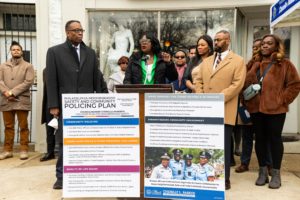 Councilmember and Majority Leader Cherelle L. Parker (9th District) unveiled her Philadelphia Neighborhood Safety and Community Policing Plan this week, which calls for investments in community policing and quality-of-life issues to restore safety and prevent crime in our neighborhoods and commercial corridors.
Councilmember and Majority Leader Cherelle L. Parker (9th District) unveiled her Philadelphia Neighborhood Safety and Community Policing Plan this week, which calls for investments in community policing and quality-of-life issues to restore safety and prevent crime in our neighborhoods and commercial corridors.
After listening to the concerns of residents, community leaders, and business owners, Councilwoman Parker designed a five-point initiative that offers concrete solutions to address the ongoing violence crisis that saw 562 homicides and 2,332 shootings last year –all-time records. This year has already seen 121 additional homicides.
“It is time to reimagine policing in Philadelphia and implement a true community policing plan to ensure the safety of everyone in Philadelphia,” Parker said at a news conference this week on a sidewalk in Overbrook, surrounded by five other members of Council, small business owners, and police officers. “I am calling for hiring 300 new beat and bike police officers, addressing quality of life issues, providing more support for victims of crime, and truly engaging the community in public safety. We have a Plan that will work, and I am going to do everything I can to ensure that it is implemented across our city.”
The release of Councilmember Parker’s Community Policing Plan coincides with President Biden releasing his Building A Better America FY23 budget, which calls for $30 billion in spending on law enforcement, crime prevention, violence intervention, and community policing, along with an additional $3.2 billion in state and local grants.
At Wednesday’s news conference on North 63rd Street, Parker said, “I am the mother to a 9-year-old son. He is a beautiful Black boy with locs. And I am well aware of the challenges that he may face growing up as a Black boy, and then as a Black man in this world, and what that means when he may interact with law enforcement. But I also know that he will be less safe if things continue the way they are. Communities will never be safe if they don’t trust law enforcement. At the same time, communities will never trust law enforcement if the only time they see them is when they’re responding to crime. Community policing is the key to building trust, and the key to keeping communities safe.”
Public safety and policing in Philadelphia seem certain to be top issues during upcoming budget hearings, and Councilmember Parker wasn’t the only member proposing action on these fronts this week.
Councilmember Derek Green (At Large) introduced legislation that would offer a $10,000 bonus to incoming police recruits, and amend the city’s existing residency requirement for police and other city jobs to allow exemptions for recent college graduates from out-of-the-area institutions and military service as well.
“The primary goal of this legislation focuses on the creation of certain incentives, including a program of proposed signing bonuses of up to $10,000 per cadet, to help bolster recruitment,” Green said. “Other cities like Seattle, Baltimore, and Newark have implemented similar incentives. In addition, the ordinance adjusts the residency requirement to allow for former residents who have completed a higher education degree in the last five years or joined the military in the past ten years, along with former city employees, to be able to obtain city employment.”
COUNCILMEMBER BROOKS TEAMS UP WITH SENATOR WARREN TO LAUNCH PUSH FOR “PHILLY WEALTH TAX”
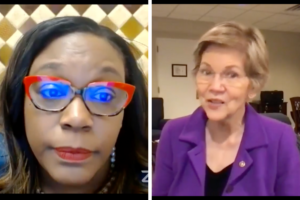 Councilmember Kendra Brooks (At-Large), joined by U.S. Senator Elizabeth Warren, D-Mass., this week announced a proposed “Philadelphia Wealth Tax” — a city tax aimed at requiring the wealthiest Philadelphians with money held in direct stock and bonds to pay what they owe to fund a recovery for working Philadelphians. The tax could bring in over $200 million to Philadelphia annually, according to an analysis done by the Pennsylvania Budget and Policy Center. The bill is co-sponsored by Councilmembers Helen Gym (At Large) and Jamie Gauthier (3rd District).
Councilmember Kendra Brooks (At-Large), joined by U.S. Senator Elizabeth Warren, D-Mass., this week announced a proposed “Philadelphia Wealth Tax” — a city tax aimed at requiring the wealthiest Philadelphians with money held in direct stock and bonds to pay what they owe to fund a recovery for working Philadelphians. The tax could bring in over $200 million to Philadelphia annually, according to an analysis done by the Pennsylvania Budget and Policy Center. The bill is co-sponsored by Councilmembers Helen Gym (At Large) and Jamie Gauthier (3rd District).
“The pandemic lit the powder keg of structural racism and disinvestment ablaze,” said Councilmember Brooks. “For decades, Philadelphia has disinvested in working class Black and Brown neighborhoods like mine, while giving tax breaks and hand-outs to big banks, developers, corporations, and the ultra-rich. The Philly Wealth Tax is our collective response to the status quo that has failed communities like mine for decades. This tax would lead the way in narrowing the racial wealth gap and creating a model for how public services can be sustainably funded in American cities.”
Councilmember Brooks was joined in a virtual news conference earlier this week by Sen. Warren.
“For far too long, many of the ultra-rich and powerful have rigged the rules in their favor,” Warren said in a statement. “So much so now that the top tenth of the 1% pay a lower effective tax rate than the bottom 99% of Americans. As millions of families have been suffering financially because of the rising costs of everyday essentials, billionaires have actually seen their wealth double since the start of the pandemic. The tax system in America is broken, and it allows the rich and the powerful to make themselves richer and more powerful at the expense of working families. It’s time to put power back where it belongs—in the hands of working families. I’m in this fight all the way and delighted to have this chance to fight alongside you.”
Brooks said her proposed Wealth tax is not a novel policy idea, and said Philadelphia and other counties had similar laws until the 1990s, when corporations, wealthy individuals and banks lobbied Philadelphia and other municipalities to eliminate wealth taxes. The tax would enact a maximum rate of 0.4%, or $4 per $1,000 on the value of direct holdings in the stock market, excluding pensions, retirement accounts and checking and savings.
SEEN ON SOCIAL MEDIA…
Looking for summer programs for children and teens? ☀️
Learn how to sign up for the program that’s right for your family!
📞 Call 215-709-5366 to find summer opportunities near you. pic.twitter.com/UR6Onwq0xx
— City of Philadelphia (@PhiladelphiaGov) March 29, 2022
IN OTHER NEWS…
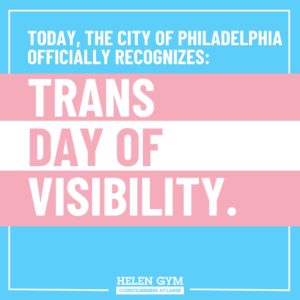 Councilmember Gym Introduces Resolution Declaring an International Transgender Day of Visibility in Philadelphia. Gym’s resolution notes: “We celebrate the existence of transgender, non-binary, and gender expansive people. We value their resilience, their vibrancy, and their ability to push society further towards inclusion for everyone, and denounce growing efforts to criminalize their existence and care, and to limit their flourishing.”
Councilmember Gym Introduces Resolution Declaring an International Transgender Day of Visibility in Philadelphia. Gym’s resolution notes: “We celebrate the existence of transgender, non-binary, and gender expansive people. We value their resilience, their vibrancy, and their ability to push society further towards inclusion for everyone, and denounce growing efforts to criminalize their existence and care, and to limit their flourishing.”
Gym’s resolution notes that City Council has led the way in supporting transgender and LGBTQ rights, approving legislation in recent years that addressed name and pronoun change policies, bathroom availability and use, gender-neutral language, and access to activities that had previously been arbitrarily segregated by gender.
In remarks in Council, Councilmember Gym praised Council for supporting transgender and LGBTQ rights, in contrast to other states that are considering or have recently passed transphobic and homophobic legislation limiting civil rights.
OTHER SIGHTS AND SOUNDS FROM THE COUNCIL WEEK
Committee on Public Safety 3-29-2022
Stated Meeting of Philadelphia City Council 3-31-2022
Mayor Kenney’s FY2023 Budget Address
PHILADELPHIA FACTS AND FIGURES
The next Stated Meeting of City Council is scheduled to take place on Thursday, April 7 , 2022 at 10 a.m. The Meeting will be held remotely due to the ongoing pandemic, and will air on Xfinity Ch. 64, Fios Channel 40 and stream at www.PHLCouncil.com/watch.
Photo: Jared Piper/PHLCouncil

